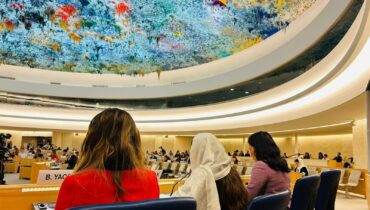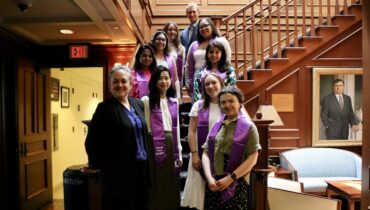At the UN Fourth World Conference on Women in Beijing in 1995, Secretary Clinton declared “women’s rights are human rights,” sparking a visionary agenda and a new platform for advancing gender equality. 25 years later, we’ve seen significant progress, but there remains a long way to go.
As we confront today’s challenges—from rising authoritarianism to the growing threat of climate change—the impetus for achieving gender equality is stronger than ever. Effectively addressing these global threats requires that we unleash the power of half the world’s population and lift up the next generation of women leaders.
From June 30 – July 2, leaders from all sectors of society will gather virtually for the Generation Equality Forum in Paris, a major platform for setting targets and defining concrete actions to advance gender equality. The Forum will focus on progress across gender-based violence, economic empowerment, sexual and reproductive health, climate justice, technology, and women’s movements and leadership.
Lasting success will not be easy.
Beijing+25: Accelerating Progress for Women and Girls, published by the Georgetown Institute for Women Peace and Security and the Rockefeller Foundation, is a landmark report that outlines strategies for achieving gender equality by overcoming the most intractable barriers. This analysis can inform the Forum’s ambitious targets.
- Changing Gender Norms By Engaging New Allies: Deep-seated discriminatory norms and sexist attitudes limit progress for women and girls, whether their political participation, access to reproductive health, or advancement in the workplace. We suggest engaging three critical agents of change—male allies, traditional and religious leaders, and advertisers—to shift attitudes.
- Enforcing and Resourcing Policies That Promote Equality: One in three women will experience sexual violence in their lives, despite most countries having some kind of domestic violence legislation on the books. Ensuring laws fulfill their promises requires a whole-of-government approach to gender equality, such as Sweden’s Feminist Foreign Policy, that includes accountability from within government and a vibrant civil society. This must be paired with innovative models to facilitate women’s leadership in the justice and security sectors and legal empowerment to access the rights and benefits the laws are meant to provide, including through one-stop centers, mobile courts, and educational platforms like SheSays India.
- Countering Backlash to Gender Equality: Efforts to accelerate women’s rights are increasingly under attack from authoritarian governments, fundamentalist groups, and others who are threatened by women’s progress. But women are fighting back. They are engaged in mass protests across Turkey, Poland, and Croatia to mobilize against gender-based violence and prevent rollback on the Istanbul Convention, and they are harnessing social media through powerful movements such as #MeToo and #NiUnaMenos. Their efforts must be supported and expanded.
- Fostering Inclusive Democracy and Women’s Leadership: Only 22 countries have women in the highest position of political power and only 25 percent of national parliamentarians are women. Getting women in top leadership positions is critical—but women must also be better represented in local and regional positions. Strategies include implementing special measures such as quotas and gender targets, building a pipeline of women leaders—as modeled by Aswat Nissa in Tunisia—and supporting civil society to hold governments accountable for inclusive institutions.
- Harnessing Technology to Promote Women’s Economic Empowerment: Technology is a gateway to new public spaces, markets, and information with major potential for boosting women’s economic activity and participation. Mobile banking, smartphones, and gender-sensitive investment strategies are expanding women’s financial inclusion, spurring entrepreneurship and strengthening women’s autonomy and decision-making. Grassroots networks, such as SEWA in India, are critical avenues for providing digital platforms and technical trainings that reach women in informal sectors.
- Supporting Youth Leadership: Around 87 percent of youth live in developing countries and represent the innovators and problem solvers of the future. Young women are taking the mantle from those who came before and are leading transformational efforts to meet the challenges of today. National and global actors must take note and provide space for youth in decision-making at the highest levels and engage them across the design, implementation, and monitoring of national programs. Multilateral initiatives such as UNDP’s Youth Global Programme for Sustainable Development and Peace (Youth-GPS) and UN Women’s Youth and Gender Equality Strategy and its LEAPs framework are examples of best practice.
- Catalyzing the Private Sector as a Key Partner: With control of the bulk of activity in most economies, the private sector is powerfully positioned to accelerate women’s progress in the workplace, media, and entrepreneurship. Greater cooperation is needed among businesses, governments, and international institutions to leverage investments and align policy agendas. The private sector can commit to gender equality principles of operation and accountability in many ways, including through the UN Global Compact, using environmental, social, and governance (ESG) criteria as an entry point, and engaging gender-responsive venture capital.
Around the world, thousands are already taking on this critical work. The Beijing+25 report offers examples of policies and programs that work to overcome barriers to progress, and it showcases new, cutting-edge tools that address the inequities COVID-19 has so vividly exposed. The challenge is now to scale these successful strategies.
The Generation Equality Forum is not just a women’s conference on women’s issues. We know that success for women is success for all, and that achieving gender equality is integral to addressing our most pressing global challenges. It will take all of us, including governments, the private sector, men, women’s movements, and especially younger women, to fuel a powerful and enduring coalition that can chart the way forward.
Allie Smith is the Program Manager at the Georgetown Institute for Women, Peace and Security, and Jess Keller serves as the Program Coordinator.


